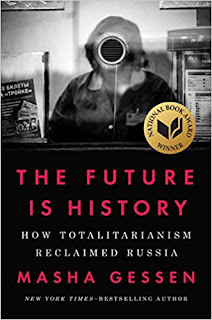The Future is History by Masha Gessen **** (of 5)
It was only chance that just as I was finishing this book, Donald Trump and Vladimir Putin were meeting alone in Helsinki. Gessen's premise is that Putin is no-goodnik with advanced KGB training, running a kleptocracy for his own benefit. Then she proves it by following the lives of half a dozen influential Russians from the 1980s when the Soviet Union collapsed to the present day as Russia was overtaken by a power-hungry, dictatorial regime.
She tracks Boris Nemtsov, Russia's most prominent liberal, until he was gunned down in an un-solved murder in the center of Moscow.
Marina Arutyunyan was one of Russia's first psychologists to read western psychological studies. When she discovered what the west had learned about mental health during the 70 years the Soviet regime was behind an iron curtain she used her new knowledge to analyze the psychology of fellow Russians: sheltered, devoid of hope of a future ever any better than the present, accustomed to deprivation, and staggered by federal rules that changed without reason or warning. Many suffered from what she diagnosed as national despair. Some self-medicated with vodka; others searched for something called stability. Putin and his cronies continued to keep the population unsettled with one hand -- incarcerating almost anyone that protests, for example -- while offering control (stability) with the other.
She tracks Boris Nemtsov, Russia's most prominent liberal, until he was gunned down in an un-solved murder in the center of Moscow.
 |
| Boris Nemtsov |
Lyosha Gorshkov, a young gay academic was run out of Russia by rabid homophobes led by Kremlin activists searching for new scapegoats. Death threats and purges of gays in Russia today are similar to pogroms directed at Jews and mass deportations of anyone opposing the state led by Stalin.
 |
| Lyosha Gorshkov, like so many Russian progressives, in exile. |
The interplay of personal narratives with thorough analysis of sociology, political theory, and intellectual history means this book requires concentration, but the payoff of The Future is History is huge. If only the President of the United States took some time to read.
What is missing is why so many Russians support Putin. Putin's popularity, based on polls, not on clearly rigged elections, is incredibly high. Although never mentioned in the book, one subtext is the question of how many Americans, perhaps also suffering from 'national despair' would foresake civil liberties, scapegoat foreigners, and exchange justice for law, order, and stability imposed by a strong leader.

Comments
Post a Comment